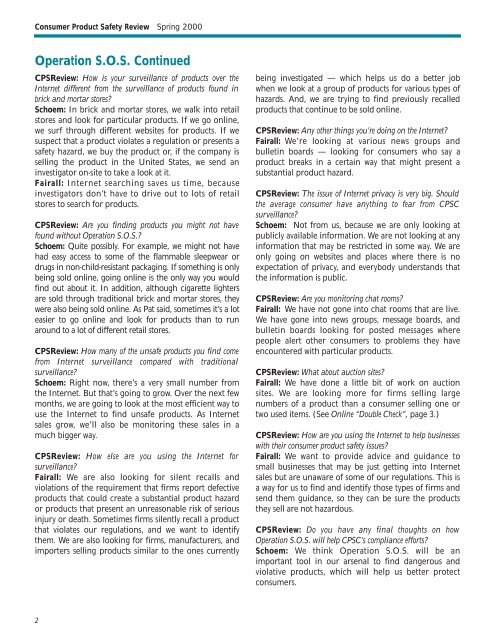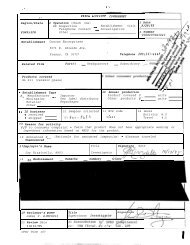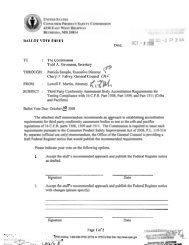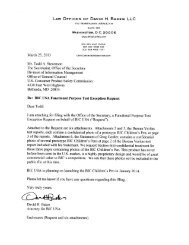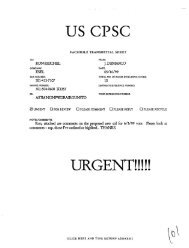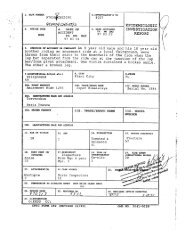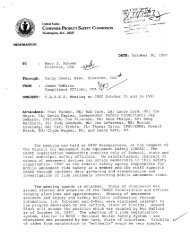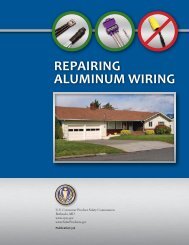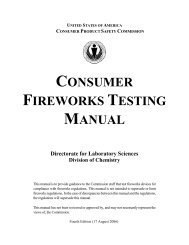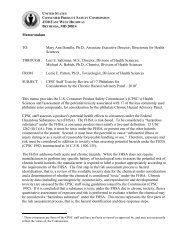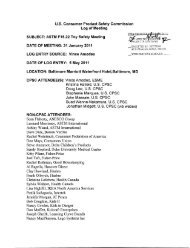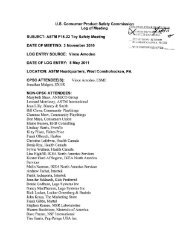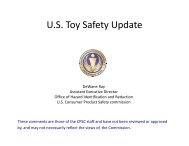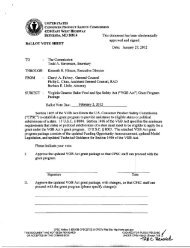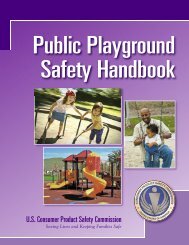Consumer Product Safety Review -Spring 2000 - CPSC
Consumer Product Safety Review -Spring 2000 - CPSC
Consumer Product Safety Review -Spring 2000 - CPSC
Create successful ePaper yourself
Turn your PDF publications into a flip-book with our unique Google optimized e-Paper software.
<strong>Consumer</strong> <strong>Product</strong> <strong>Safety</strong> <strong>Review</strong> <strong>Spring</strong> <strong>2000</strong><br />
Operation S.O.S. Continued<br />
CPS<strong>Review</strong>: How is your surveillance of products over the<br />
Internet different from the surveillance of products found in<br />
brick and mortar stores?<br />
Schoem: In brick and mortar stores, we walk into retail<br />
stores and look for particular products. If we go online,<br />
we surf through different websites for products. If we<br />
suspect that a product violates a regulation or presents a<br />
safety hazard, we buy the product or, if the company is<br />
selling the product in the United States, we send an<br />
investigator on-site to take a look at it.<br />
Fairall: Internet searching saves us time, because<br />
investigators don’t have to drive out to lots of retail<br />
stores to search for products.<br />
CPS<strong>Review</strong>: Are you finding products you might not have<br />
found without Operation S.O.S.?<br />
Schoem: Quite possibly. For example, we might not have<br />
had easy access to some of the flammable sleepwear or<br />
drugs in non-child-resistant packaging. If something is only<br />
being sold online, going online is the only way you would<br />
find out about it. In addition, although cigarette lighters<br />
are sold through traditional brick and mortar stores, they<br />
were also being sold online. As Pat said, sometimes it’s a lot<br />
easier to go online and look for products than to run<br />
around to a lot of different retail stores.<br />
CPS<strong>Review</strong>: How many of the unsafe products you find come<br />
from Internet surveillance compared with traditional<br />
surveillance?<br />
Schoem: Right now, there’s a very small number from<br />
the Internet. But that’s going to grow. Over the next few<br />
months, we are going to look at the most efficient way to<br />
use the Internet to find unsafe products. As Internet<br />
sales grow, we’ll also be monitoring these sales in a<br />
much bigger way.<br />
CPS<strong>Review</strong>: How else are you using the Internet for<br />
surveillance?<br />
Fairall: We are also looking for silent recalls and<br />
violations of the requirement that firms report defective<br />
products that could create a substantial product hazard<br />
or products that present an unreasonable risk of serious<br />
injury or death. Sometimes firms silently recall a product<br />
that violates our regulations, and we want to identify<br />
them. We are also looking for firms, manufacturers, and<br />
importers selling products similar to the ones currently<br />
2<br />
being investigated — which helps us do a better job<br />
when we look at a group of products for various types of<br />
hazards. And, we are trying to find previously recalled<br />
products that continue to be sold online.<br />
CPS<strong>Review</strong>: Any other things you’re doing on the Internet?<br />
Fairall: We’re looking at various news groups and<br />
bulletin boards — looking for consumers who say a<br />
product breaks in a certain way that might present a<br />
substantial product hazard.<br />
CPS<strong>Review</strong>: The issue of Internet privacy is very big. Should<br />
the average consumer have anything to fear from <strong>CPSC</strong><br />
surveillance?<br />
Schoem: Not from us, because we are only looking at<br />
publicly available information. We are not looking at any<br />
information that may be restricted in some way. We are<br />
only going on websites and places where there is no<br />
expectation of privacy, and everybody understands that<br />
the information is public.<br />
CPS<strong>Review</strong>: Are you monitoring chat rooms?<br />
Fairall: We have not gone into chat rooms that are live.<br />
We have gone into news groups, message boards, and<br />
bulletin boards looking for posted messages where<br />
people alert other consumers to problems they have<br />
encountered with particular products.<br />
CPS<strong>Review</strong>: What about auction sites?<br />
Fairall: We have done a little bit of work on auction<br />
sites. We are looking more for firms selling large<br />
numbers of a product than a consumer selling one or<br />
two used items. (See Online “Double Check”, page 3.)<br />
CPS<strong>Review</strong>: How are you using the Internet to help businesses<br />
with their consumer product safety issues?<br />
Fairall: We want to provide advice and guidance to<br />
small businesses that may be just getting into Internet<br />
sales but are unaware of some of our regulations. This is<br />
a way for us to find and identify those types of firms and<br />
send them guidance, so they can be sure the products<br />
they sell are not hazardous.<br />
CPS<strong>Review</strong>: Do you have any final thoughts on how<br />
Operation S.O.S. will help <strong>CPSC</strong>’s compliance efforts?<br />
Schoem: We think Operation S.O.S. will be an<br />
important tool in our arsenal to find dangerous and<br />
violative products, which will help us better protect<br />
consumers.


